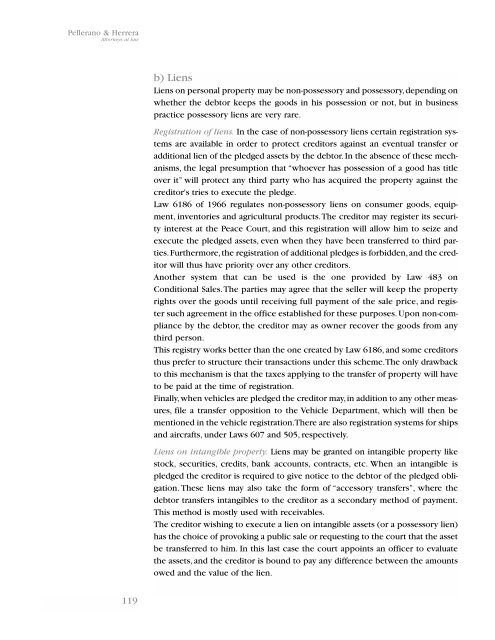do business in the Dominican Republic - Pellerano & Herrera
do business in the Dominican Republic - Pellerano & Herrera
do business in the Dominican Republic - Pellerano & Herrera
- No tags were found...
Create successful ePaper yourself
Turn your PDF publications into a flip-book with our unique Google optimized e-Paper software.
<strong>Pellerano</strong> & <strong>Herrera</strong>Attorneys at lawb) LiensLiens on personal property may be non-possessory and possessory,depend<strong>in</strong>g onwhe<strong>the</strong>r <strong>the</strong> debtor keeps <strong>the</strong> goods <strong>in</strong> his possession or not, but <strong>in</strong> <strong>bus<strong>in</strong>ess</strong>practice possessory liens are very rare.Registration of liens. In <strong>the</strong> case of non-possessory liens certa<strong>in</strong> registration systemsare available <strong>in</strong> order to protect creditors aga<strong>in</strong>st an eventual transfer oradditional lien of <strong>the</strong> pledged assets by <strong>the</strong> debtor. In <strong>the</strong> absence of <strong>the</strong>se mechanisms,<strong>the</strong> legal presumption that “whoever has possession of a good has titleover it” will protect any third party who has acquired <strong>the</strong> property aga<strong>in</strong>st <strong>the</strong>creditor's tries to execute <strong>the</strong> pledge.Law 6186 of 1966 regulates non-possessory liens on consumer goods, equipment,<strong>in</strong>ventories and agricultural products.The creditor may register its security<strong>in</strong>terest at <strong>the</strong> Peace Court, and this registration will allow him to seize andexecute <strong>the</strong> pledged assets, even when <strong>the</strong>y have been transferred to third parties.Fur<strong>the</strong>rmore,<strong>the</strong>registration of additional pledges is forbidden,and <strong>the</strong> creditorwill thus have priority over any o<strong>the</strong>r creditors.Ano<strong>the</strong>r system that can be used is <strong>the</strong> one provided by Law 483 onConditional Sales.The parties may agree that <strong>the</strong> seller will keep <strong>the</strong> propertyrights over <strong>the</strong> goods until receiv<strong>in</strong>g full payment of <strong>the</strong> sale price, and registersuch agreement <strong>in</strong> <strong>the</strong> office established for <strong>the</strong>se purposes.Upon non-complianceby <strong>the</strong> debtor, <strong>the</strong> creditor may as owner recover <strong>the</strong> goods from anythird person.This registry works better than <strong>the</strong> one created by Law 6186, and some creditorsthus prefer to structure <strong>the</strong>ir transactions under this scheme.The only drawbackto this mechanism is that <strong>the</strong> taxes apply<strong>in</strong>g to <strong>the</strong> transfer of property will haveto be paid at <strong>the</strong> time of registration.F<strong>in</strong>ally,when vehicles are pledged <strong>the</strong> creditor may,<strong>in</strong> addition to any o<strong>the</strong>r measures,file a transfer opposition to <strong>the</strong> Vehicle Department, which will <strong>the</strong>n bementioned <strong>in</strong> <strong>the</strong> vehicle registration.There are also registration systems for shipsand aircrafts, under Laws 607 and 505, respectively.Liens on <strong>in</strong>tangible property. Liens may be granted on <strong>in</strong>tangible property likestock, securities, credits, bank accounts, contracts, etc. When an <strong>in</strong>tangible ispledged <strong>the</strong> creditor is required to give notice to <strong>the</strong> debtor of <strong>the</strong> pledged obligation.These liens may also take <strong>the</strong> form of “accessory transfers”, where <strong>the</strong>debtor transfers <strong>in</strong>tangibles to <strong>the</strong> creditor as a secondary method of payment.This method is mostly used with receivables.The creditor wish<strong>in</strong>g to execute a lien on <strong>in</strong>tangible assets (or a possessory lien)has <strong>the</strong> choice of provok<strong>in</strong>g a public sale or request<strong>in</strong>g to <strong>the</strong> court that <strong>the</strong> assetbe transferred to him. In this last case <strong>the</strong> court appo<strong>in</strong>ts an officer to evaluate<strong>the</strong> assets, and <strong>the</strong> creditor is bound to pay any difference between <strong>the</strong> amountsowed and <strong>the</strong> value of <strong>the</strong> lien.119







